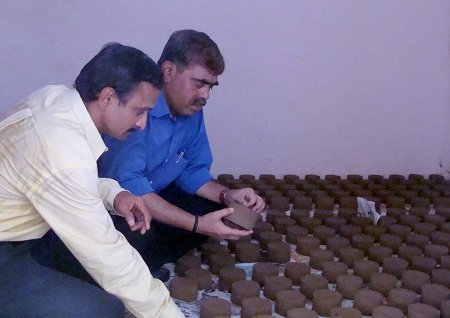He’s currently building and selling affordable, electricity-free, maintenance-free water filters made out of clay, sand and sawdust in India. His interest in water filters began several years ago when he was involved in restoring dilapidated temples and buildings, many of them 1,200 years old, in southern India. As part of this effort, detailed on Social Enterprise Buzz.com, he visited about 1,000 villages in India over five years.
Below, he discusses the hygiene problems he saw during his travels and some of the science behind his efforts to help resolve them. Tomorrow, he’ll discuss the advantages of the technolgoy he’s using and the sustainability of his business.
Kyle Poplin: As your traveled India, you discovered most people don’t have access to clean water and toilets, so you decided to address the problem. What made you think you could make a difference?
Chandrasekaran Jayaraman: When we wanted to document all the heritage temples around the state, we found that many masons who claimed to be temple artisans were using modern material and killing the antique heritage look and aesthetics of old temples, which is irreparable. So we decided to educate the common man on the value of heritage and started the REACH Foundation (Rural Education and Conservation of Heritage).
While traveling, most villages did not have good drinking water or good toilets. The locals used to rent a lodge for us if we had to stay over, and run for bottled water bottle from a local shop. But the local shop does not guarantee that the sealed water bottle is genuine.
The problem was, the locals were unaware that untreated water and open defecation together brings diseases. Having dabbled with the best technology and machines, having made products to make the rich multinational corporations richer, I was feeling guilty for not using the science I have learned to address the basic needs of the majority of the populace in our own country.
This made me go in search of electricity-free water filters, as most reverse osmosis machines run on electricity, which is not available continuously in all parts of the country.
(A government official checks the quality of Watsan’s clay candles with Chandrasekaran Jayaraman, far left.)
KP: When you first started looking at this problem, what were some of the challenges you encountered?
Chandra: I found that the government-run Council of Scientific and Industrial Research’s Institute of Minerals and Materials Technology in Bhubaneshwar was giving licenses to use a patented technology to make micro-filters using clay. I was among the 116 license holders in 2009 who happily signed for and brought back the technology to our towns, thinking that the problem could be easily solved and we would change the world in no time. There was enough room for all licensees, even if all of them worked together!
But to my dismay, I found that within a year we were among only four still working on this technology. Others had stopped working with it, as the formula was not giving consistent results.
Thanks to my interest in materials and their behavior, I found that different clay from different parts of the country behaves differently, due to rheology, bonding strength, etc. A village buff myself, I happily visited many villages where traditional potters live and asked them how they select clay for pottery, which gave me good insights into the right clay and how to use it to make filters. Hence, I revised the formula and arrived at a consistent mix with which I make my candles (filters) even today.
K.P.: In May 2013, you founded Watsan Envirotech. (The name Watsan comes from a combination of “water” and “sanitation.”) Can you describe how you make clay-based water filters?
Chandra: We started as a proprietary company which still holds the license for manufacturing terafil candles (terracotta + filters = terafil), but later I found two big impediments in scaling up:
1) The supply-demand gap is huge and manual methods advocated by the CSIR don’t work for mass production; and
2) Making terafil is similar to brick-making, which requires sunny days to dry the candles before sintering them in a kiln. The rainy season, which runs four to six months in India, is not conducive to making candles continuously. This was a big deterrent, as workers had to be laid off and when called back again, they didn’t return. Anyone who turned up would be new, so we had to start all over again teaching them the formula, the right mixing methods, candle molding and drying, etc.
And there was another big problem: Most of the population was not educated about the ill effects of bad water they consumed. So, before selling the filters, the customers needed to be taught what is good and bad in drinking water.
So, to take the fight to a bigger platform, we needed automation of the plant; scaling at least 100 times and making a plant that could run, rain or shine. So I designed my own machine which can mold the candles continuously, bake them in a kiln which is indoors, run using a gasifier fueled by sawdust waste, collecting all the carbon emissions and depositing them under a water bath, thereby emitting zero carbon in the air, unlike other open-type kilns which burn bricks and pollute the air.
To help make things more professional and hire the right people, I converted my proprietary firm to Watsan Envirotech Private Limited.


Leave A Comment